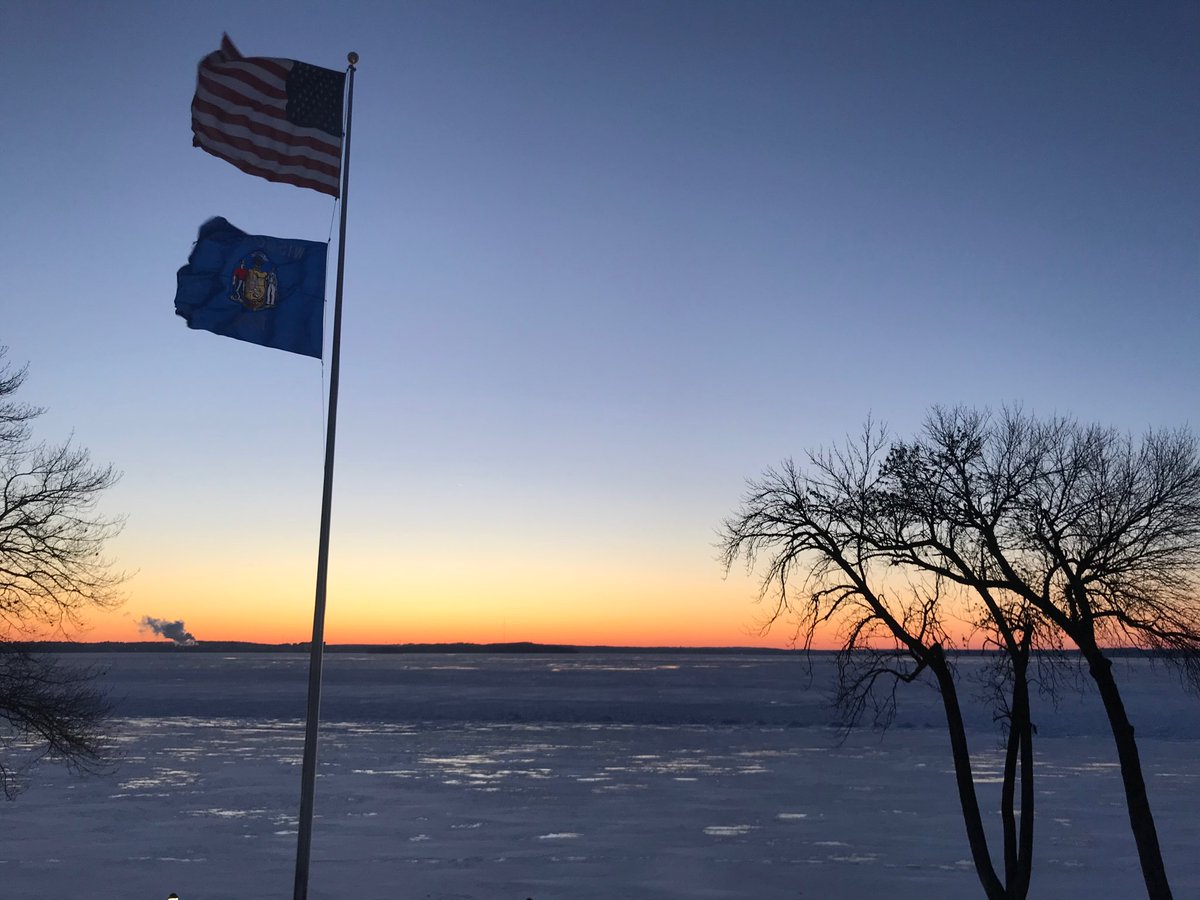[Updated from 7/1/18 - - Note also that leading mining booster GOP State Sen. Tom Tiffany asked a reliably-compliant Gov. Walker to cut through the budget the DNR scientists Tiffany felt were spending too much time on climate science.]
Earlier Sunday as I was writing the post below I had not noticed Paul A. Smith's report on the impact of warming temperatures on fish in Wisconsin's waterways - - Can the walleye population rebound?
Hat tip to Smith. He's the font.
My original blog was linked to a tweet an oblivious Walker posted showing Lake Mendota from his official residence, and includes this excerpt:
-----------------------------------------------------
Beautiful sunset.

That's the UW-Madison campus across the lake, to the west.
-------------------------------------------------------------------------
Earlier Sunday as I was writing the post below I had not noticed Paul A. Smith's report on the impact of warming temperatures on fish in Wisconsin's waterways - - Can the walleye population rebound?
Researchers say the reasons for the walleye decline aren't fully understood and are likely complex.But recent studies have shown a link between higher water temperatures and reduced production of walleyes, a cool-water fish.And I'd completely missed this alarming report.
By 2040, less than 4% of Wisconsin lakes might have walleye, study predictsBut I'd already touched on the subject Sunday when I reposted this earlier blog item about Walker ignoring the impacts of climate change on Wisconsin, including its walleye and other fish species.
 |
| Angler with a walleye. WI DNR photo |
My original blog was linked to a tweet an oblivious Walker posted showing Lake Mendota from his official residence, and includes this excerpt:
-----------------------------------------------------
Beautiful sunset.

That's the UW-Madison campus across the lake, to the west.
You can't see it in the photo, of course, but on the campus shoreline sits a laboratory of an historic institution, the UW Limnology Center.
Limnology is the study of lakes; the science was basically founded on the UW Campus and Lake Mendota is often said to be the most-studied lake in the country.
Lake Mendota is not just your run-of-the-mill lake among Wisconsin's 15,000. It's is a huge, unique climate change laboratory where experts examine the lake's temperature, depth, fish population, responses to climate change and other features widely studied for more than the postcard-pretty photo opportunity Walker likes to snap:
Limnology is the study of lakes; the science was basically founded on the UW Campus and Lake Mendota is often said to be the most-studied lake in the country.
Lake Mendota is not just your run-of-the-mill lake among Wisconsin's 15,000. It's is a huge, unique climate change laboratory where experts examine the lake's temperature, depth, fish population, responses to climate change and other features widely studied for more than the postcard-pretty photo opportunity Walker likes to snap:
Predicted water temperature growing degree days in three example Wisconsin lakes from current conditions to mid-century and late-century conditions based on projected climate change. Lakes will respond differently to climate change depending on their size, depth, water clarity, and starting temperatures, as demonstrated by the different trajectories of Lake Mendota, Green Lake, and Trout Lake.
And it was on the Limnology school's blog just over a year ago that UW professors blasted Walker's DNR for having scrubbed ciimate change data and science - - facts impacting Lake Mendota and other bodies of water in Wisconsin which Walker does not see or appreciate - - from official state websites:
* Warmer conditions, especially in winter, are dramatically reducing the duration of ice cover, giving ice fishers less time to fish.
* Deer hunters are finding less snow on the ground during the gun season.
* Many brook trout streams are threatened by a warming climate.
* In lakes, dominance by the cool water walleye is shifting to dominance by the warm water largemouth bass.
* Several popular game species, like the ruffed grouse, are shifting their ranges northward and becoming less abundant.
* Increases in extreme rain events are increasing runoff from farm fields into downstream waterways and lakes, reducing water quality.
* High temperatures worsen health-damaging smog (ozone). The hot summer of 2012 produced very high ozone levels, worsening asthma and harming crops.
* Some key forest trees are declining in a warming Wisconsin, and the season for timber harvesting is getting shorter.
* Several tree species are threatened as warming allows more pest insects and diseases to move north.
This is why they are starting to have more bass tournaments in WI. They are trying to keep fisher people coming here with their tourist dollars.
ReplyDeleteThis is a great post. Very informative and the links are interesting. Thanks!
ReplyDeleteThat is one of the things that scientists that they axed were working on.....Effect of climate change on fishing.
ReplyDelete